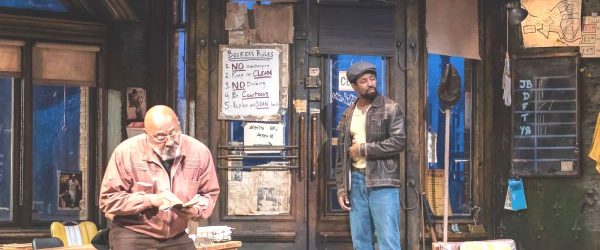Life under Stress
Were I as eloquent as August Wilson, I might be able to articulate how great his masterpiece, Jitney, was but unlike Wilson, I am no Shakespeare. Suffice it to say the production, presented at Seattle Rep, was an incredibly memorable evening filled with poetic wit, gripping characters, fantastic original music, astounding visual effects and a story which captured the dreams and struggles of the African American community at a particular moment in history. But like all great drama, its themes were universal. And then there was the humor!!!!!!!!!!!!!!!!
Part of the Pittsburgh Cycle, plays that August Wilson wrote for every decade of the 20th Century about the African American community in his hometown, Pittsburgh, PA, Jitney refers to a “Car Service,” a technically illegal unlicensed pre-curser to Über. Jitney car services arose when regular taxi services would not take passengers to, or from, African American neighborhoods, which were not well served by public transportation.
To fill the gap entrepreneurial minded folks set up under-the-table taxi services with privately owned cars, an office and a telephone to ferry folks around. The play Jitney takes place in the “office” of a Jitney service, as the drivers, and their pals hang around waiting for calls. Office is a euphemism for a run-down store front, which is serviceable but not exactly in the mid-town Manhattan style.
The opening completely silent scene, is worthy of a Chaplin film, two drivers, one young, one late middle-aged, play checkers, to exquisite jazz music. When they do speak they introduce one of the major themes of the play, the generational conflict between impetuous youth and the subdued wisdom of age, which runs throughout the play in more than one relationship.
As in all work place dramas and comedies, there is both a lot of bickering and a lot of joking among the colorful cast of drivers, who include Turnbo, played by Ray Anthony Thomas, whose gossiping both stirs up conflict and helps resolve it. Turnbo’s gossiping is a clever device by the author, as Turnbo’s gossip functions like a traditional Greek chorus. It fills in background to the audience without telegraphing or creating lengthy exposition. Underneath the façade of a gossip, Thomas portrays a rather lonely man ineptly searching for connection.
Played by Amari Cheatom, Turnbo’s nemisis on the checker board and in life, is Youngblood, a Viet-Nam vet, with a young family to provide for, who seems sneaky and untrustworthy but just needs to learn how to communicate. The resident alcoholic, Fielding, played by Anthony Chisholm, wavers between self-destruction and redemption. Doub, played by Keith Randolph Smith generally tries to mind his own business and keep peace at the office while the boss Becker is away.
Then there is Becker! Becker is the kind of man who would have been a CEO of a major corporation, or a General, had he been born into a different generation. He is a wise upstanding man, a pillar of the community and is proud of his successes. But he is lacking in compassion for his son, who has disappointed him.
It is the universal theme played out against this specific background, a parent sacrifices everything, suffers indignity so his only child, a son, can do better, and then his son throws it all away. It is easy to say, “Let you child make their own decisions,” when society is working for them, but when society is working against them, one is faced with a dilemma; how to make sure they make the right decisions because there are no second chances, while allowing them to actually become an adult and make their own decisions.
Frequent visitors to the office are Shealy, played by Harvy Blanks, a well-dressed bookie who uses the phone there to run numbers rackets, Philmore, by Brian D. Coats, a hotel doorman who uses the service to help him during his domestic crises, and Rena, Young Blood’s girlfriend. Played by Nija Okoro, Rena epitomizes a lot of the struggles of young people at the lower end of the socio-economic scale, compounded by racism. How to get ahead, while raising a young child, working and going to school, with a partner, who himself is struggling with issues of his own.
All this is played against a background of two major calamities: 1) the city wants to urban renew and board up the office along with the whole block, which could be Armageddon for the Jitney service. 2) Becker’s son, who he never visited, is about to be released from a 20 year stint in prison.
Although these two conflicts do create heavy drama, the play is laced with humor and wit. The poetic dialogue and various running jokes kept the audience laughing in spite of the sometimes tragic communication between the father and son. The most powerful scene in the play, and there were several powerful scenes, was a verbal confrontation when the son visits the father for the first time after 20 years in prison. Rather than being supportive and helpful, the father piles on the shame and blame, but he does articulate his anguish, as does the son. It is not the exchange one would find in a family counseling session, but the truthful brutality spoken by each exemplified the tragedy. Both actors Steven Anthony Jones as the father, Becker, and François Battiste, as Booster, were superb. Even as I found myself wishing they wouldn’t be so nasty to each other, and stop using “you” statements, I felt compassion for both of them.
Everything about this play worked well, there was original music by Bill Sims Jr., which added non-verbal punctuation to the first silent scene, the costumes by Toni-Leslie James were vintage ‘70’s In addition to the bell-bottoms, leather and boots there was an actual Leisure Suit worn by Shealy the bookie. “Leisure Suits” were these pastel colored polyester casual trouser and jacket ensembles worn by middle-aged men, when the rest of us only ever wore blue jeans. Shealy’s Leisure Suit was almost fluorescent green, like his character, flamboyant and in sufficiently bad taste to take advantage of his friends.
Lighting by Jane Cox, was particularly evocative, as there were a lot of scenes of the early morning light creeping in through the windows. The scene where Booster, the ex-convict son, collapses upon learning of his father’s death, was made more intense by creative lighting. All this was brought together by Director, Ruben Santiago-Hudson.
Since I got there early, as a result of light traffic, I was able to study the set for about half and hour. Designer David Gallo’s set was simply amazing! It was full of period details which just spoke volumes about the milieu. It was a work of art and will take anybody back to their college/first apartment days or to a start-up business in a store-front or indeed a new theatre company operating out of a basement or a warehouse.
Just to add another great touch to an already perfect evening, when we left the theatre, a street musician was playing Jazz Saxophone!!!
The three shows I have seen at Seattle Rep this season have all been outstanding. This is another hit! Get your tickets now!!!
Jitney. By August Wilson. Produced by Erik Falkenstein and Ron Simons in conjunction with Manhattan Theatre Club presented by Seattle Repertory Theatre. 155 Mercer, Seattle 98109, Seattle Center Tues- Sun 7:30 Sat. Sun 2:00 pm. PWYC Sun March 8 and 10th. Til March 29. Tickets https://www.seattlerep.org/plays/1920/august-wilsons-jitney/




















